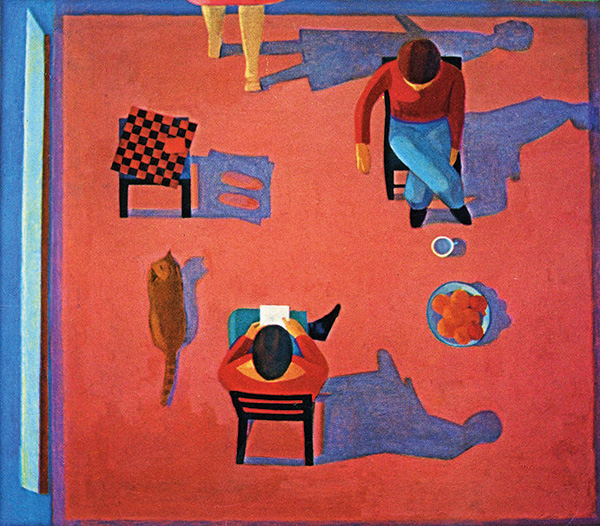Subtotal: $
Checkout-

Grand Canyon Classroom
-

The Homeschooling Option
-

Teaching the One Percent
-

Educating for Freedom
-

Why I Became a Firefighter
-

The School that Escaped to the Alps
-

Does Teaching Literature and Writing Have a Future?
-

Schools for Philosopher-Carpenters
-

Deerassic Park
-

Why We’re Failing to Pass on Christianity
-

For the Love of Public School Teaching
-

Let Children Play
-

The Music on Mount Sinai
-

The Green Paint Incident
-

Reverence for the Child
-

How Math Makes You a Better Person
-

Tell an Old Story for Modern Times
-

Should I Read Scary Fairy Tales to My Child?
-

Lernvergnügenstag: A Day for the Joy of Learning
-

Freedom of Speech Under Threat
-

Poem: “A Meditation on Figs”
-

Poem: “Hearing a Lecture on the Mandelbrot Set”
-

Poem: “On Raphael’s La Disputa del Sacramento”
-

We’re Alone Together
-

Disagreeing Respectfully
-

Life without Magic
-

The Jakob Hutter Story
-

Readers Respond
-

Free Care and Prayer
-

Our Home, Their Castle
-

Sister Penelope in Expectation
-

Covering the Cover: Educating Humans
-

The Most Valuable Joads
-

Timber Framing with Teenagers

Iron Sharpens Iron
Real friendship is the most powerful education.
By Johann H. Huleatt
January 20, 2025
“It’s a new day, in the morning,
and it’s all we’ve ever wanted,
and we might not have it now,
but I can see that change is coming.
We’re better together.”
—Lathan Warlick, “Better Together”
The lyrics of Lathan Warlick’s “Better Together,” an election-season anthem, point toward a crucial question: Can we remember how to be friends? Can we remember how to value the friendships that overcome the wedge issues, skillfully recycled in each election cycle? Those attack ads may seize our attention, but they do not pave the way for a truly flourishing life.
We need what we’ve always needed: faithful civil servants. But the political alienation we feel from one another undermines the God-ordained order of civil society. If we hate and distrust one another and therefore only conditionally trust the government that arises from our democratic process, how can we obey the injunction of Romans 13 to submit to governing authorities? Is there any nation so resilient that it is immune from the mutually assured destruction caused by the resentment we’ve been fostering toward each other? “If you should take the bond of goodwill out of the universe,” Cicero warns in On Friendship, “no house or city could stand, nor would even the tillage of the fields abide.”

Caren Canier, Three Friends, oil on canvas, 1978. All artwork by Caren Canier. Used by permission.
As fellow citizens, we have weathered our fair share of storms in the past decade, from a pandemic to hurricanes. Such shared experiences ought to have formed reservoirs of goodwill and trust that we might tap into to propel our society toward a future of camaraderie.
But something has gone wrong. Cicero, again, sounds strikingly familiar: “Our political practice has already swerved far from the track and course marked out for us by our ancestors.” What is the main problem, in his view? What has permitted this deviation from the good practice of the citizens of the old republic, and its slide into tyranny and toward empire? It sounds so familiar: “I seem now to see the people estranged from the Senate, and the weightiest affairs of state determined by the caprice of the mob. For more people will learn how to start a revolution than how to withstand it.”
Above all, Cicero says, it is the friendships of wise and virtuous citizens which preserve a state. Considering the lives and friendships of good citizens of the earlier republic, “it is impossible for us even to suspect any one of these men of importuning a friend for anything contrary to good faith or to his solemn oath, or inimical to the commonwealth. Therefore, let this law be established in friendship: neither ask dishonorable things, nor do them, if asked.” To preserve the republic, we must first mend our friendships; to mend our friendships we must become citizens of virtue.
Without virtue, says Cicero, it is possible to maintain relationships, but not true friendships. Cicero goes so far as to claim, “Friendship cannot exist except among good men.” He commends what he calls “natural friendships,” the familiar relationships we find so easy: “fellow countrymen are preferred to foreigners and relatives to strangers, for with them Nature herself engenders friendship.”
But these easy friendships are, he says, “lacking in constancy.” These natural friendships should better be called “relationships,” and, he says, “friendship excels relationship in this, that goodwill may be eliminated from relationship while from friendship it cannot.” In other words, if I am not a good person, and don’t will the true good for my cousins or my compatriots, I can still get along with them, but without this goodwill, I cannot be said to be truly their friend, nor can the nearly divine power of state-preserving friendship flow from such compromised relationships.
“A man of many companions may come to ruin,” one can almost hear Cicero say, “but there is a friend who sticks closer than a brother”
(Prov. 18:24).
Aristotle concurs. He famously identifies three levels of friendship: those based on pleasure, on utility, and on character. Friends of pleasure might go fishing or golfing together; friends of utility might help each other in business; but friends of good character, friends “in the good,” love the good in each other, share their joys and sorrows, and are driven by a genuine interest in each other’s souls, with complete honesty.

Caren Canier, Two Women Having a Conversation, oil on canvas, 1975.
Cicero speaks of friendship with something that approaches holy awe: “Friendship is nothing else than an accord in all things, human and divine, conjoined with mutual goodwill and affection, and I am inclined to think that, with the exception of wisdom, no better thing has been given to man by the immortal gods.” It might seem overblown, this pagan emphasis on friendship, but Christ speaks similarly: “No one has greater love than this, to lay down one’s life for one’s friends” (John 15:13).
The friendship of a wise and good person, which for Cicero is the greatest treasure one could possess, is offered to us in Jesus, who, in his friendship, shapes us into people who can offer such friendship back to him, and to each other.
Aquinas takes up the theme. He is careful here; he wants to preserve the uniqueness of the dependence each of us has on God alone: we do not need others in the way we need God. Nevertheless, “if we speak of the happiness of this life, in order that man may do well, whether in the works of the active life or in those of the contemplative life, he needs the fellowship of friends.”
Aquinas emphasizes the selfless aspect of this virtue, suggesting that one can only attain universal love (agape) by first experiencing partial love (philia). But he wants to say more than this, and he takes his cue from Augustine: “The fellowship of friends conduces to the well-being of happiness. Hence Augustine says that ‘the spiritual creatures receive no other interior aid to happiness than the eternity, truth, and charity of the Creator. But if they can be said to be helped from without, perhaps it is only by this that they see one another and rejoice in God, at their fellowship.’”
Elsewhere in Summa Theologica, Aquinas wrestles with the question of how we can possibly have friendship with enemies and sinners. We can desire their good, surely. But can we truly love them? In response, he notes how our love for our friends extends to those whom they themselves love. Therefore, since all people are loved by God, we can love everyone in true friendship, just as we love each other in Christ.
It is Augustine, though, who is the most thoroughgoing Christian philosopher of friendship. Drawing on Cicero’s definition of friendship as agreement with kindliness and affection about things human and divine, Augustine adds in Christ. True Christian friendship is an expression of being united with one another as friends through our union with Christ. Ultimately, the friendship that matters most is our friendship with God. In a sermon, Augustine seems to overflow with this insight and its attendant joy:
Let us love, let us love freely and for nothing. It is God, after all, whom we love, than whom we can find nothing better. Let us love him for his own sake, and ourselves and each other in him, but still for his sake. You only love your friend truly, after all, when you love God in your friend, either because he is in him, or in order that he may be in him. (Sermon 336.2)
It is the delightfulness, the over-and-aboveness, of friendship that Augustine emphasizes. We need friends – but we don’t need something outside of them from them. We need them, themselves: “A friend is to be loved freely, for his own sake, not for the sake of something else. If the rule of friendship urges you to love human beings freely for their own sake, how much more freely is God to be loved, who bids you love other people! There can be nothing more delightful than God” (Sermon 385:4).
On October 10, 2024, my family’s dear friend Nina Postupack died, after a two-year battle with cancer. She and her husband were an elderly Catholic couple whose company and fellowship have been a source of encouragement and joy for us for over a decade. We’ve exchanged family visits during Christmas; we’ve spent summers, autumns, winters, and springs watching my children play soccer and basketball and baseball.

Caren Canier, Socially Distanced, oil on panel, 2021.
At Nina’s funeral, the outpouring of gratitude and love was remarkable. She had been the first female county clerk in Ulster County, and the words at her death – from both sides of the political aisle – testified to the character of someone who had given grace and dignity to that role. Congressman Marc Molinaro (R) reflected on the way that Nina had been a champion of community outreach, and a kind and welcoming face of government for countless people. “Her legacy,” he said, “is one of dedication, passion, and unwavering service.” Congressman Pat Ryan (D) added, “Ulster County lost a true public servant today. Nina Postupack was one of the finest people I have ever had the privilege to know and work with. She dedicated her life to making government more accessible and uplifting our neighbors throughout the county. Nina was always quick with a smile and perpetually focused on what she could do to serve others and make their lives better and easier.”
It seems banal. A county clerk in an upstate New York office, a Catholic wife and mother. But surely this is precisely what this whole tradition of friendship means – or at least, one of the things. It is part of the legacy that Christianity transmits to us from the ancient Greeks and Romans, that this woman could embody the civic virtue, public friendship, and magnanimity that Cicero had limited to the greatest men in Rome. She was, in her quiet way, a true public servant.
“What gives us consolation in this human society, filled as it is with errors and troubles, if not the sincere loyalty and mutual love of true and good friends?” That’s Augustine again, in The City of God. That was Nina, for our family. And that is the kind of friendship and service, inspired by the Holy Spirit, which will knit together the frayed civic fabric of our countries, even today.
And perhaps our differences can provide their own gifts. “As iron sharpens iron, so one person sharpens another,” we have in Proverbs. If left alone, both blades would become dull and worthless.
“No longer do I call you servants,” says our Lord, “for the servant does not know what his master is doing; but I have called you friends, for all that I have heard from my Father I have made known to you” (John 15:15). It is part of our discipleship that we should become friends with Christ, and that, being friends with him, we can love even our enemies – even our opponents, the people on the other side of the aisle – because he loves them.
Together as friends in the good, and particularly as friends in Christ, the divisions that have racked our country can be transcended. It is learning to live in this friendship that will bring about a new era, beginning in our homes, our families, our communities, and spreading from there across the country, and across the world.
Already a subscriber? Sign in
Try 3 months of unlimited access. Start your FREE TRIAL today. Cancel anytime.













































Deacon Ory Schultheis
I just finished reading the “Iron Sharpens Iron” by Johann H Huleatt. I would like to point further past Augustine and argue that St Aelred of Rievaulx actually is the most thoroughgoing Christian philosopher on Friendship. He takes Cicero’s “On Friendship,” and Augustine’s material on friendship, digests them and synthesizes them and re-presents them in “Spiritual Friendship.” Aelred of Rievaulx writes extensively on spiritual friendship, describing it as a relationship that fosters growth in love—both for each other and for God. For Aelred, spiritual friendship is a sacrament of God’s love, reflecting the reciprocal love shared within the Trinity. He believes that humans, created in the image of this triune God, are called to relationships characterized by mutual dialogue, sharing, and self-giving. Through such friendships, we encounter aspects of God’s love, which he refers to as a form of holy charity Aelred’s writing emerged during the Age of Friendship, a time when love was culturally celebrated, especially in the courts and through troubadour songs. Monastics transformed this courtly love into a Christian spirituality of love. Aelred combines contemporary ideas with classical philosophy (e.g., Cicero), Augustine’s theology, and his own psychological insights, offering a unique and accessible guide to friendship. Aelred defines friendship as a "mutual agreement on all things sacred and profane, accompanied by goodwill and love" (borrowed from Cicero). True friendship, he argues, is based on reciprocity, with both parties giving and receiving equally. He emphasizes that Christian friendship is rooted in Christ, beginning, continuing, and being perfected in Him. Friendship in this sense is eternal, a reflection of God’s unending love. If a friendship ends, it was never truly Christian. Aelred sees friends as "another self," people to whom you can share your joys, burdens, and deepest thoughts without judgment. He compares those without friends to beasts, incapable of sharing or receiving emotional support. Friendship is a spiritual practice that leads us closer to God, as we carry our friends in prayer and grow together in Christ. However, not all friendships are spiritual, and Aelred provides guidelines to discern whether a friendship is rooted in authentic Christian love. He suggests examining the purity of intention, whether the relationship is reasonable or merely self-serving, the moderation with which we treat the other’s individuality, and whether we value the relationship itself rather than any external benefits. Friendship is a gift to be chosen and committed to, emphasizing responsibility in nurturing the relationship. In spiritual friendships, Aelred outlines these essential qualities: loyalty, discretion, right intention, and patience. Loyalty is the cornerstone, as a true friend stands by you through all circumstances, seeing beyond superficial qualities to the heart of the person. Confidentiality is also critical—without it, true self-disclosure cannot happen. Aelred acknowledges that such deep, spiritual friendships may be rare, but they are a gift that can only be fully realized in eternity, when all will be united with God in perfect love. Aelred’s guidelines on friendship are more relevant than ever in this time when human relationships are often trivialized. His teachings highlight the demands of authentic Christian love, which can be applied to all forms of relationships, including marriage, spiritual accompaniment, and community life. His work exemplifies the types of relationships found in the lives of saints.